Macrory Surname Ancestry ResultsOur indexes 1800-1900 include entries for the spelling 'macrory'. In the period you have requested, we have the following 13 records (displaying 1 to 10): Buy all | | | Get all 13 records to view, to save and print for £64.00 |
These sample scans are from the original record. You will get scans of the full pages or articles where the surname you searched for has been found. Your web browser may prevent the sample windows from opening; in this case please change your browser settings to allow pop-up windows from this site. Gentry in London
(1856)
The Post Office London Directory for 1856 includes this 'Court Directory', listing alphabetically by surname and christian name the upper class residents of the capital with their postal addresses. 'In order to afford space for the addresses, the abbreviation "esq." for esquire has no longer been appended to each name in the Court Directory. It should be understood that such should be added to the name of every gentleman in the following pages to which no inconsistent addition is affixed.' Decorations, honours &c. are generally given. Some gentlemen appear who are also listed (as professional men, &c.) in the commercial section. Those with second residences in the provinces usually have the country address given as well.MACRORY. Cost: £4.00.  | Sample scan, click to enlarge

| Dublin Electors
(1865)
This alphabetical list of electors for the City of Dublin for 1865 is annotated with details of the votes cast in the election of 15 July 1865 for a member of Parliament. The candidates were John Vance, Esq., D. L. (V), Benjamin Lee Guinness, Esq., D. L., LL. D. (G), and Jonathan Pim, Esq. (P). The first column gives, in bold, the initial of the ward in which lay the property that was the elector's qualification. The second column gives the elector's sequential number (alphabetically) within that ward. Then the elector's full name is given, surname first, and address, usually including house number. The votes cast are shown on the right: where these columns are blank, the elector did not vote. The key to the ward names is: A, South Dock; B, Donnybrook; C, Rathdown; D, Trinity; E, South City; F, Royal Exchange; G, Mansion House; H, Fitzwilliam; I, Wood Quay; K, Merchants' Quay; L, Usher's Quay; M, Arran Quay; N, Inns' Quay; O, North City; P, Rotundo; Q, Mountjoy; R; North Dock. S indicates the register of freemen.MACRORY. Cost: £4.00.  | Sample scan, click to enlarge
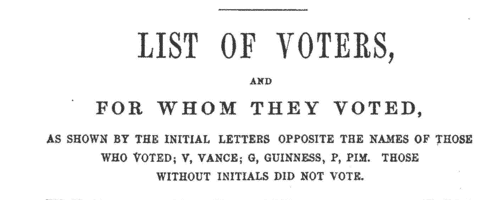
| Dublin University Electors
(1868)
The roll of all persons entitled to vote at elections for members to serve in Parliament for the University of Dublin lists living graduates of the university, arranged alphabetically by surname and christian name(s), with current residence, dates at which their degrees were conferred - Vern. denoting the Spring, Aest. the Summer, and Hiem. the Winter Commencements - and date of registration. Members of the Senate and electors on the books of Trinity College are distinguished by a dagger. Where an elector's name is given in italics, he was no longer known at the residence given.MACRORY. Cost: £4.00.  | Sample scan, click to enlarge

| Freeholders in county Londonderry
(1873-1875)
Owners of an acre or more, whether resident there or elsewhere: with their addresses; the acreage; and a valuation of the land. The survey commenced in February 1873, the last returns being received in November 1875.MACRORY. Cost: £4.00.  | Sample scan, click to enlarge
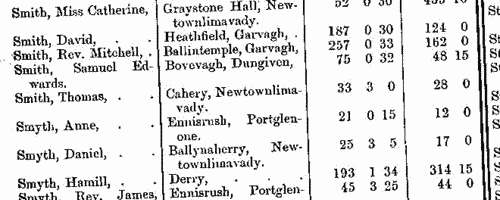
| Baptists
(1876)
The Baptist was a weekly newspaper, with some general news and political coverage, but mainly devoted to chronicling Denominational Intelligence, i. e. the doings of the Baptist churches in Britain and Ireland. July to December 1876.MACRORY. Cost: £6.00.  | Sample scan, click to enlarge
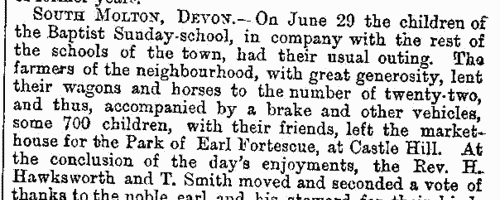
| Baptists
(1876)
The Baptist was a weekly newspaper, with some general news and political coverage, but mainly devoted to chronicling Denominational Intelligence, i. e. the doings of the Baptist churches in Britain and Ireland. January to June 1876.MACRORY. Cost: £6.00.  | Sample scan, click to enlarge
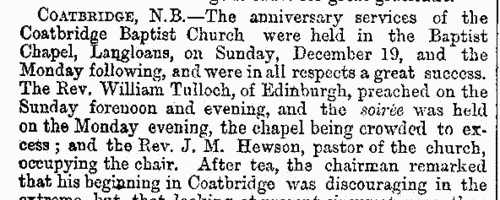
| Irish Debtors and Bankrupts
(1880)
Bills of sale (binding assets to a creditor/lender), and bankruptcies in Ireland, April to June 1880MACRORY. Cost: £6.00.  | Sample scan, click to enlarge

| City of Oxford Electors
(1882)
The electoral register for the City of Oxford for 1882 lists persons entitled to vote at any election of a member or members to serve in parliament for the city or parliamentary borough of Oxford in that year. The names are arranged alphabetically in the parishes of Saint Aldate, Binsey, Saint Clement, Cowley, Saint Ebbe, Saint Giles, Headington, Holywell, Iffley, Saint John, Saint Martin, Saint Mary Magdalen, Saint Mary the Virgin, Saint Michael, North Hincksey and South Hincksey (in Berkshire), Saint Peter in the East, Saint Peter le Bailey, and Saint Thomas. In each case the voter number (out of a total of 6190) is given in the first column; then full name, surname first; place of abode; nature of qualification (such as house, &c.); and the name and situation of the qualifying property (often the same as the place of abode). At the end of each parish there is a list of freemen to be registered as parliamentary voters, with number, full name (surname first) and place of abode; and a list of lodgers registered as parliamentary voters, with number, full name (surname first), description of rooms occupied, and whether furnished or not, address, amount of rent paid, and name and address of landlord.MACRORY. Cost: £4.00.  | Sample scan, click to enlarge

| News in The Law Times
(1883-1884)
Volume 76 of The Law Times, 'The Journal of The Law and The Lawyers', a weekly publication, runs from 3 November 1883 to 26 April 1884. This index covers news items from its pages.MACRORY. Cost: £6.00.  | Sample scan, click to enlarge

| Boys entering Marlborough College
(1885)
The public school at Marlborough in Wiltshire was founded in 1843. In 1952 this, 9th, edition of the college register was published, being a revision by L. Warwick James of the 8th edition (of 1936): but for the years before 1936 it does not merely repeat the 8th edition, because Warwick James was able to correct the 19th-century entries with information from newly-discovered letters and books from 1843 to 1853, and the school lists from 1844 onwards. The roll is arranged by year, and within each year by term of entrance, and then alphabetically by surname within each term. Each boy is assigned a number within the year: then his name is given, surname first, and, in brackets, his house. The houses within the college were called B1, B2, B3, C1, C2 and C3, and the Lower School (L Sch); the out college houses were Preshute, Priory, Cotton, Hermitage, Littlefield, Barton Hill, Summerfield and Upcot. Then there is given the boy's father's name (surname and initials) and address (at entrance), the boy's date of birth (b) and month of leaving (l). Where the boy represented the school at Rugby football (XV) or cricket (XI), in the rifle corps (VIII, or RC XI), that is indicated. There is a brief summary of achievements in later life, and, where known, and date of death or (in italics) address as in 1952. MACRORY. Cost: £4.00.  | Sample scan, click to enlarge
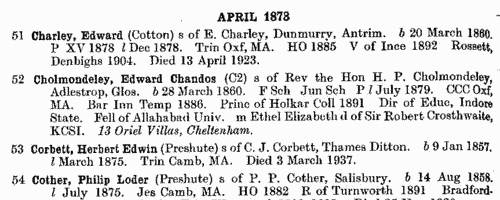
|
| 1 | 2 |  |
Research your ancestry, family history, genealogy and one-name study by direct access to original records and archives indexed by surname.
|












